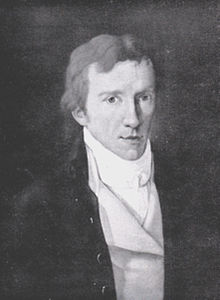Karl von Baden (1770-1830)
Anton Karl Freiherr von Baden (born October 7, 1770 in Freiburg im Breisgau ; † February 14, 1830 ibid) was State Councilor of the Grand Duchy of Baden and member of the manorial nobility in the first chamber of the Baden Estates Assembly in 1819 and 1822. With him, the family died Barons from Baden in the male line.
Life
Karl was born the son of the Baden privy councilor Franz Anton Freiherr von Baden and the Countess Sophia von Sickingen-Hohenburg . He began his studies in Freiburg and finished them in Vienna in 1795.
The legacy of the Duke of Modena and Reggio Hercules III. , the Habsburg Archduke Ferdinand , became lord of the Breisgau and the Ortenau in 1803. When the new state administration was formed on September 17, 1803, Karl von Baden was appointed president of the land rights office of the highest civil court. Hermann von Greiffenegg , the district president, recommended him to Archduke Ferdinand Karl: “He has enough sense that he'll pick everything up. It will also be very healing for him, and he has superfluous talents to become an immensely capable judicial businessman if he breaks the very high opinion of himself. If he also improves his stubbornness, he is also skilled in political business. One can only hope for the best from a talented young man. ”Even after the Breisgau passed to the Grand Duchy of Baden (1805/06), Karl initially remained in this position. Appointments to the Privy Council, Police Director and Landvogt in Freiburg followed. In 1812, Grand Duke Karl appointed him a Councilor of State.
During the Congress of Vienna, representatives of the mediatized imperial princes and the imperial knighthood tried to maintain their class privileges. In January 1815 the plan for a general aristocratic association for the whole of Germany came up, with the name the chain . The association, to which around 50 people belonged, elected Karl von Baden as chairman. Werner von Haxthausen and Joseph von Laßberg were ascribed a great influence in this group - but the association was unable to achieve political success.
In the first two sessions of the Baden Estates Assembly in 1819 and 1822, Karl took part in the First Chamber as a representative of the manorial nobility. The conservative members of the government accused him of sympathizing with the liberal views of MPs Karl von Rotteck and Ignaz Heinrich von Wessenberg .
In 1823 Karl withdrew to private studies and spent a long time on his regular estates in Liel . He was an art collector and art patron. He supported the young painter Franz Joseph Zoll by enabling him to travel to Paris in 1802, and the copper engraver Johann Baptist Metzger , who came from Staufen im Breisgau , when he went to Florence in 1801 to train.
Karl married Maria Beatrix Sophia von Kageneck (* 1787, † 1846). There were no children from this marriage. His underage nephew Bruno Freiherr von Türckheim zu Altdorf , who on December 31, 1833 also gave Grand Duke Leopold von Baden permission to unite names and coats of arms , became his will. From then on his descendants called themselves Barons von Türckheim , called von Baden.
literature
- Friedrich von Weech: Karl Freiherr von Baden . In: Badische Biographien - first part , Heidelberg 1875, page 29/30 online on the homepage of the Badische Landesbibliothek
- Volker Schupp : Sinclair in Vienna , In: Christoph Jamme (Hrsg.): Homburg before the height in the German intellectual history: Studies on the circle of friends around Hegel and Hölderlin. Stuttgart: Klett-Cotta, 1981, pages 231–244 reprint online on the Freiburg document server (PDF; 998 kB)
Individual references / comments
- ↑ Hermann Kopf : The city of Freiburg and the Breisgau under the rule of the Duke of Modena . In: Schau-ins-Land 1958, page 91 online
- ↑ s. Schupp p. 236
- ↑ s. Weech p. 30
- ^ (Philipp Wilhelm) Rappenegger: Franz Joseph Zoll . In: New Nekrolog der Deutschen, 1833, Part Two, Weimar 1835, page 559 online
- ^ Friedrich Hefele: Johann Baptist Metzger von Staufen, 1771–1844, engraver and art dealer in Florence , Schau-ins-Land 1983, pages 137–154 online
- ↑ s. E (dmund) von der Becke-Kluechtzner: Stamm-Tafeln des Nobility of the Grand Duchy of Baden, Baden-Baden 1886, page 491 online ; Bruno was the son of Marie Anne Elisabeth Freiin von Baden (a sister of Anton Karl) and Christian Friedrich Jakob Freiherr von Türckheim zu Altdorf
| personal data | |
|---|---|
| SURNAME | Baden, Karl von |
| ALTERNATIVE NAMES | Baden, Anton Karl Freiherr von (full name) |
| BRIEF DESCRIPTION | Baden State Council |
| DATE OF BIRTH | October 7, 1770 |
| PLACE OF BIRTH | Freiburg in Breisgau |
| DATE OF DEATH | February 14, 1830 |
| Place of death | Freiburg in Breisgau |
